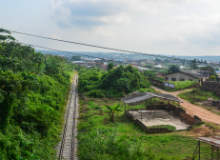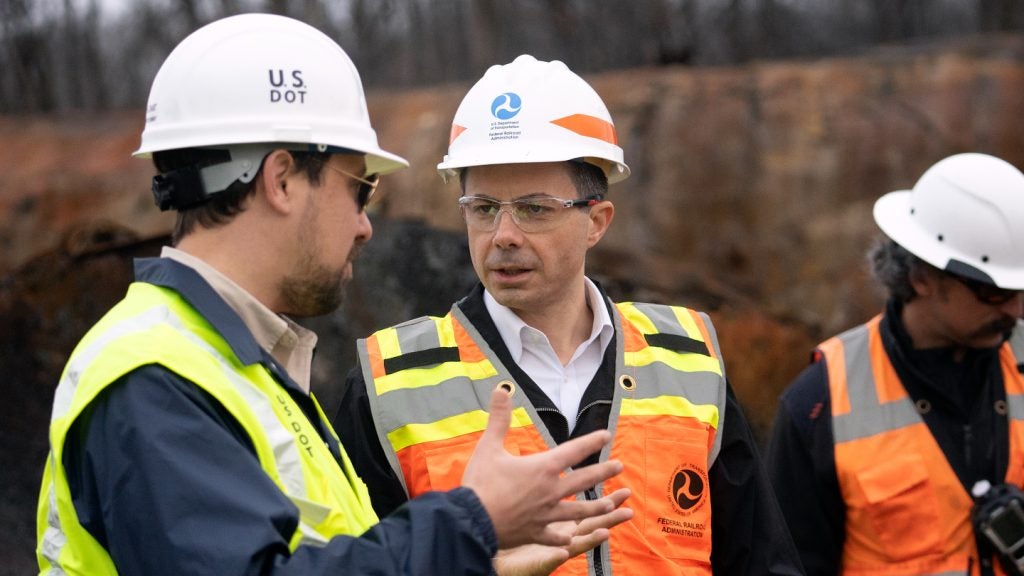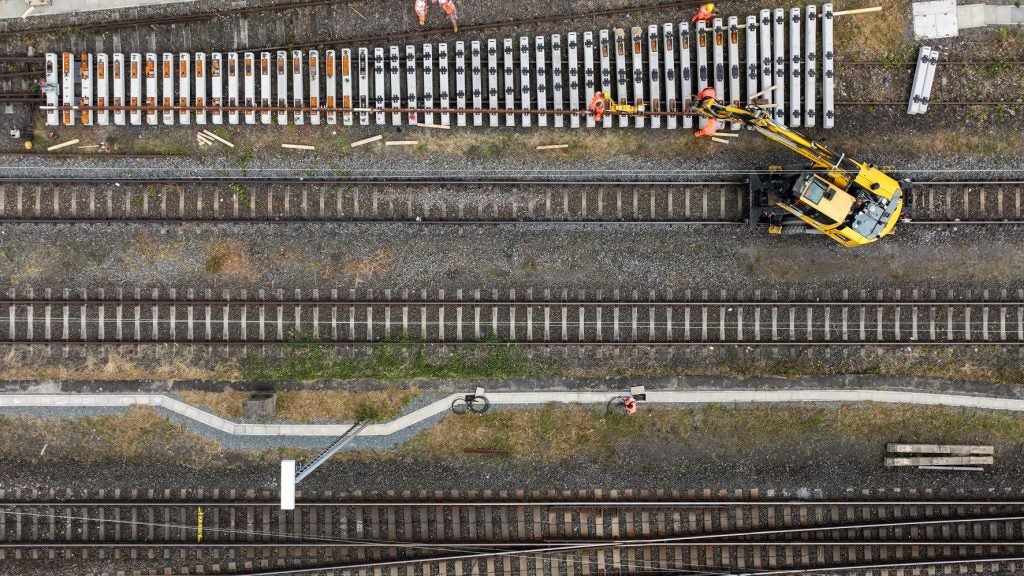
Struggling to stay afloat amid falling oil prices and a crippling fuel scarcity that practically brought the country to a standstill late last year, Nigeria seems to be fighting a losing battle.
But President Muhammadu Buhari’s new government has a vision to stimulate socio-economic growth by privatising the country’s railway network, a move hoped to breathe new life into the failing public transportation system.
As Africa’s biggest economy, Nigeria has been hit hard by tumbling crude prices. On 1 February, Buhari reached out to the World Bank asking for a $3.5bn emergency loan to bridge a growing gap in the country’s budget.
But despite the recent crisis, a recurring ordeal for Nigerian people has been the overlooked, underfunded and barely coping railway system which has seen little restructuring since the country first gained independence in 1960.
New infrastructure is needed desperately
The lack of reliable public transportation, coupled with absent freight connections to neighbouring West African countries, has taken its toll on Nigeria’s population in a number of ways. Its road network, built when traffic levels were far lower than they are today, is crumbling beneath vehicles and pedestrians alike. The pollution levels caused by this intense use of personal vehicles are sky-high and traffic accidents and congestion are prevalent.
Speaking at the University College London, Dr Ibidun Adelekan, geographer and professor at the University of Ibadan, Nigeria addressed the critical shortcomings of the country’s transport system: “The relegated status of the Nigerian Railways is a classic illustration of a transportation policy which has sidelined an important and cheap means of transport to foster the growth of privately owned long haulage transport services.”
How well do you really know your competitors?
Access the most comprehensive Company Profiles on the market, powered by GlobalData. Save hours of research. Gain competitive edge.

Thank you!
Your download email will arrive shortly
Not ready to buy yet? Download a free sample
We are confident about the unique quality of our Company Profiles. However, we want you to make the most beneficial decision for your business, so we offer a free sample that you can download by submitting the below form
By GlobalData“The policy has [created] a disorganised, unregulated private sector-owned road transport system providing freight and passenger services,” Adelekan said. “The effects of this are bad roads, inadequate fleets of buses or trucks, irregular, inadequate and overcrowded trains and airplanes and congested ports.”
Now, the country is waiting with bated breath for the enactment of the new Nigerian Railway Authority Bill which aims to open the network to the private sector and propel it into the future.
The Nigerian railway operator’s murky past
The failures of the Nigerian Railway Corporation (NRC) can be traced long into its past. After the first railroad was constructed and nationwide service began in the early 1900s, NRC took over as the railways operator in 1955, a position it still holds today. As early as 1964, NRC entered a long period of decline and poor management.
Over the following three decades, NRC filed for bankruptcy several times, while both freight and passenger services were discontinued altogether, sometimes for six months at a time. This has unavoidably led to the proliferation of road transportation, which today accounts for 90% of the sub-sector’s contribution to the nation’s GDP. By contrast, freight and passenger use of the 3,500km of narrow gauge, single-track railway contributes less than half per cent to the sector’s GDP.
Due to a history of trade with Europe, there are only two main lines in operation – from Lagos to Nguru and Port Harcourt to Maiduguri – leaving the country almost devoid of lines servicing intra-country trade within West Africa.
“From marine, through land and railway to air transport, the minutest of infrastructural integration is seemingly lacking in the Nigerian transport system,” an editorial in Nigeria’s Leadership newspaper reads. “The bulk of the blame is put on the existence of near-medieval laws which discourage, or outright disallow, private sector participation in the country’s core transport investments.”
Today, ineffective management is partly down to an overlap of authority in transportation. An overview of Nigeria’s transport sector by Oxford Business Group (OBG) states: “The challenge of overlapping authority is particularly apparent in projects that intersect the federal and state governments’ jurisdictions.”
“Nigeria’s 36 states – plus the federal capital territory of Abuja – are each entitled to form their own transportation ministries, embark on their own public work projects and issue their own PPPs [public-private partnerships],” OBG’s analysis reads.
Systematic failures to transform, modernise and build new capacity across Nigeria’s railway network has led to the isolation of destitute areas. Last year, when a government-level payment row sparked a severe fuel crisis across the country, black market fuel prices hit the roof, putting a great financial strain on commuters. Traffic congestion was so severe at times that motorists spent between seven and eight hours to complete a 5km journey.
As Adulakan argues, “it is important to factor in the relationships among transport, socio-economic development and human well-being in the planning of transportation systems in the countries of sub-Saharan Africa.”
Privatising Nigeria’s railways to stimulate growth
When drafting a new transportation strategy, one important aspect to consider is Nigeria’s “undeniable growth potential”, as OBG points out, especially as the country houses the largest petroleum industry on the African continent.
During his presidential acceptance speech in May 2015, Buhari expressed his commitment to national infrastructure revitalisation. “We shall implement a national infrastructure master plan that will provide construction and related jobs across the land,” he said. “Furthermore, by improving our transportation infrastructure through road, rail and port construction we expand the outer bounds of economic growth, as no economy can grow beyond the capacity of its infrastructure.”
The first phase of an ongoing 25-year master plan saw up to $10bn invested in rail projects in the six years leading up to 2013. According to NRC, the rehabilitation of existing narrow-gauge lines is now nearly complete. Throughout the upcoming phases, the plan looks to develop standard-gauge, modern gauge and eventually high-speed railway systems across the country.
But the most important move, and a source of equal amounts of hope and debate, has been the Nigerian Railway Authority Bill 2014, approved by the Federal Executive Council in mid-February last year.
The bill, one of the eight proposals aimed at elevating the country’s entire transport system, would allow the private sector to build, operate and maintain Nigeria’s railways. At its core, the bill holds stipulations that leading parastatals will have their assets divested.This would remove the pressure for them to compete as operators, allowing them to take up the role as efficient regulators instead.
The bill is currently awaiting final approval from the National Assembly, Nigeria’s executive government branch. So far, despite repeated calls for action, the bill has made very slow progression.
“Such bills have been read, assessed and reviewed many times by the executive from one administration to the other, for over a decade and half, but failed to transform into acts,” reads a scathing editorial in the Leadership newspaper.
“Transport practitioners across the country continue to yearn for the enactment of these bills which promise the foundation for the formulation or activation of an effective national transport policy.”
To date, “there is no evidence that any infrastructure projects in the rail sub-sector have been successful in attracting private finance”, according to a case study by Cambridge Economic Policy Associates. The analysis, published in August 2015, lists previously unsuccessful projects such as the Abuja Light Rail project, part sponsored by a $500m loan from the Export-Import bank of China, or the Eko Rail PPP project, a 25-year, $400m project sponsored by the Lagos Metropolitan Area Transport Authority which is still undergoing negotiations with bidders.
Pent-up demand should attract investment
Despite the currently bleak status, there is pent-up demand for better transportation in this country of 170 million people spread over 900,000km2, presenting attractive business opportunities for many foreign investors. OBG points out that many of the world’s major infrastructure firms have already expressed interest in or are currently bidding for work in Nigeria.
Global consultant firm McKinsey & Company found that Nigeria needs to spend at least $839bn by 2030 on infrastructure.
In this year’s Federal Budget, the government pledged $1bn in capital expenditure to the Federal Ministry of Transportation, with a further $69m in recurrent expenditure.
Infrastructure spending in the country is expected to increase by nearly 11% annually until 2025, PricewaterhouseCoopers (PwC) notes, from $23bn to $77bn, by which point Nigeria, along with South Africa, will account for three quarters of sub-Saharan Africa’s total expenditure.
The first step in transitioning from road to rail has already been taken at the start of this year, when Minister of Transportation Rotimi Chibuike Amaechi announced that starting in 2016, petroleum products will be transported by rail an attempt to reduce hazard and alleviate the strain on the country’s roads.
Alstom business development manager Tola Sapara told OBG that he expects little advances on the passing of the railway bill before a new government comes in. “Nigeria comes with its immediate challenges, but in the long run, if you are patient and persistent, there will be a nice pay-off,” he said.
“Nigeria stands out as one of Africa’s most attractive markets in terms of anticipated transportation infrastructure rollout.”







